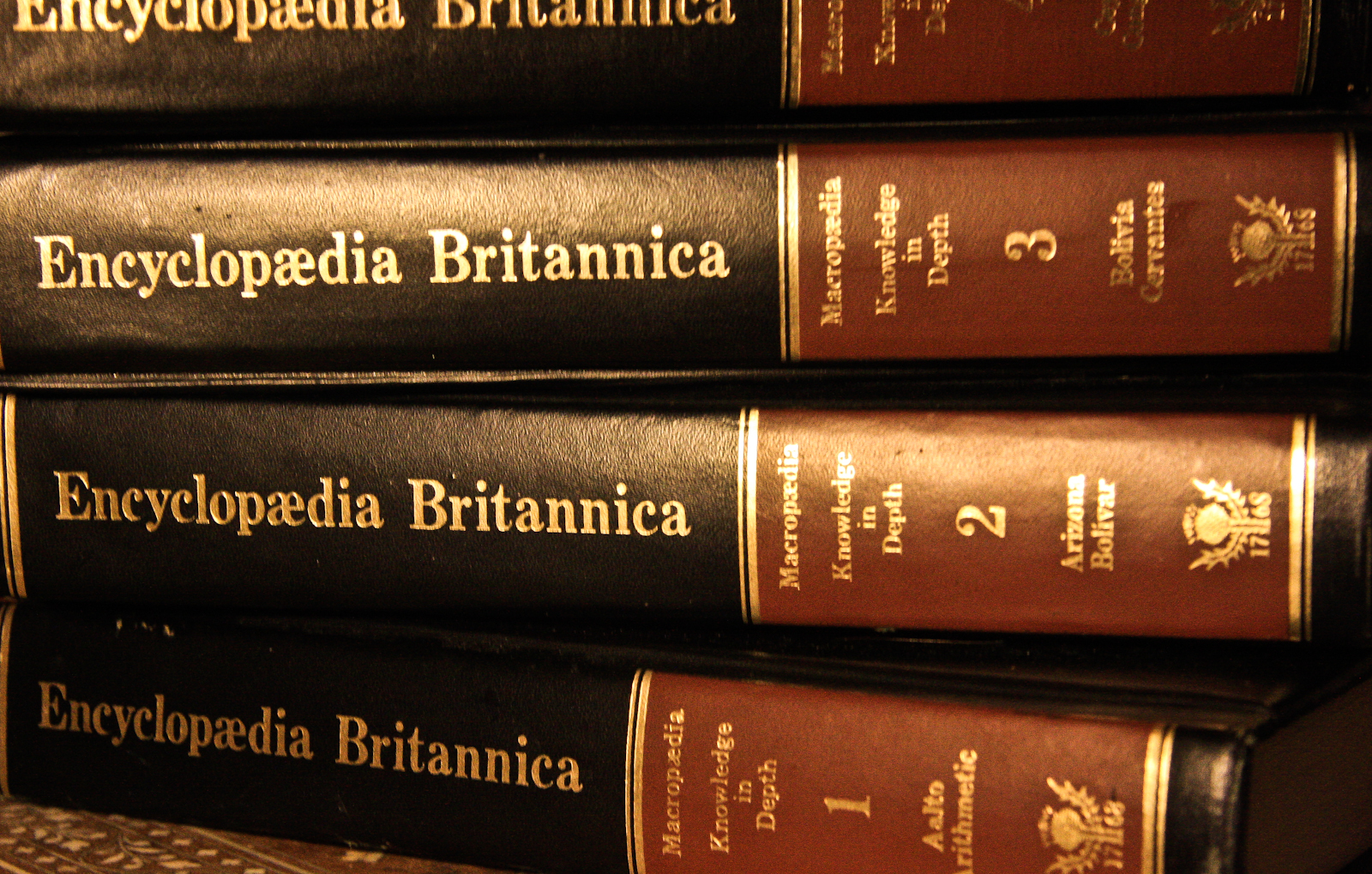And the train of thought goes like this:
- How did I marry someone who has the identical leather-bound, gilt-edged set of Encyclopedia Britannica that I have?
- Where do encyclopedias go to die?
- Where did all the door-to-door salesmen go?
- How come it’s mainly political candidates and religious folks that drop by?
- Now that I’ve framed in and insulated the front porch, will I hear if someone knocks?
********************
Josh Goldstein, a former EB salesman, hints at the first subject as he describes his best sale to a single mother in a poor neighbourhood:
My guess is that the encyclopedia held out the promise of a bright future for her children, which would only grow brighter with the luxury binding and other enhancements that came with the premium package. She thought that the man in the suit (me) was an emissary from another, better America who would change her children’s destinies.
My parents didn’t graduate from high school but they earned a decent living and pulled themselves up by the bootstraps in a time when bootstraps seemed more malleable. I distinctly remember the salesman sitting in our shag-carpeted living room. My parents had already bought in to the concept but it was we kids who pushed for the deluxe package. “Oh yes we’re going to use them!” I chimed in with my older brother. I believe the set was well over a thousand dollars, which is plenty expensive even 30 years on. And no, we didn’t use them much. The books are still immaculate, tucked away in boxes in my parents’ basement.
My husband’s family emigrated from Italy in 1977, leaving behind a villa and a comfortable existence in Emilia-Romagna. His father was degreed and multilingual but switching countries at the age of 42 is hard on the employment prospects. They arrived with little English and essentially started anew. Mother-in-Law says they bought the EB’s because my husband liked them. It also meant the children would stay closer to home instead of galavanting off to the local library. They bought the fanciest set because Father-in-Law always believed in buying the best he could afford.
We married within our social and economic class which explains the presence of our common encyclopedias.
*****************
The eldest boys gave their room a thorough clean-out, which included removing two-thirds of the treasures from their overflowing bookshelves. Husband piled these excesses into Rubbermaid bins and attempted to take them down to the basement. I intercepted, forbidding anything as precious as books to be dumped into the Black Hole of Calcutta.
Our generous bookshelves are already triple-stacked and crammed and I’m at a loss as to where these extras should go. I eye the bottom row of EB’s that gather dust. “What about…” I start and am immediately cut off at the knees. “Don’t touch things that aren’t yours,” I am told. “They’re not yours to get rid of.” So I bide my time with the plastic tubs until a storage revelation manifests itself.
If I get really clever I could remake the encyclopedias into something quite different, like bookshelves and occasional tables. Technically, that’s not getting rid of them but it would involve a whole lot of touching.
****************
In some quarters, thieves were considered more desirable than encyclopedia salesmen.
http://www.youtube.com/watch?v=R9n11xtjZ3Y
But wait long enough and situations often resolve themselves. With the advent of the internet, and accessibility to every known bit under the sun, Encyclopedia Britannica laid off its entire North American sales force in 1996. Other booksellers quickly followed suit. No great mystery there.
But apparently the profession was amusing while it lasted. This young lad spent six months alternating between selling books and smoking pot, chronicling his misadventures at http://encyclopediasalesman.blogspot.ca/.
****************
In the Old Country itinerant sales and tradesmen were part of daily life. Mother-in-Law tells of the knife-sharpener who would arrive with a grindstone mounted on the back of his bike shouting “Arrotino!” As he cranked his peddle the grindstone would turn and sharpen knives, scissors, and farmer’s utensils in situ. The ragpicker would holler “Stracci!” and the women would come out with their old cloth to sell. He would also buy the skins of rabbits that had been butchered, cleaned and hung to dry. But she refused to buy from the linen salesman, as she was certain his goods were stolen.
We occasionally get Jehovah’s Witnesses, purveyors of natural gas contracts, and would-be politicians knocking at our front door. I would welcome a monthly visit from the knife sharpener (who could also do our ice skates, mower blades, and gardening implements), a regular Goodwill collection, grocery deliveries, fresh milk, fresh bread and handmade meals delivered to the door. I’d also appreciate visits from the hairdresser, licensed masseuse, and chiropractor. And that’s just what I can think of off the top of my head.
****************
I secretly harbour mixed feelings about people dropping by my house unannounced. I chalk it up to my 13-year-long privacy and silence deficit. But maybe what I really dread is being crashed by the one village idiot whom I don’t want anywhere near my property. Anyone I love will just march through the backdoor and holler as they are meant to do, and come and go as they please (P.S. Don’t worry if you live in my village and are reading this blog entry: the idiot is probably not you. Trust me on this.)
So the question of whether I’ll hear someone knocking on the new front door is moot. I’ll hear them if I want to.
